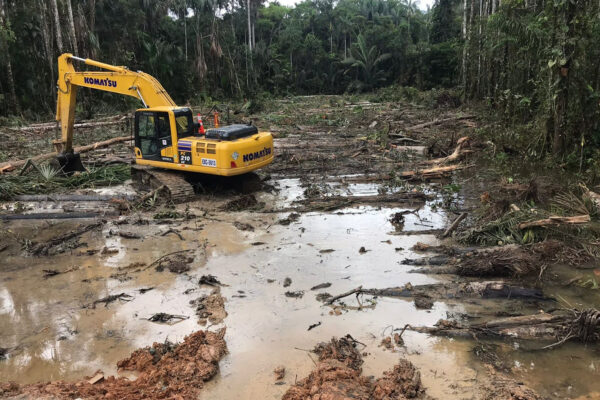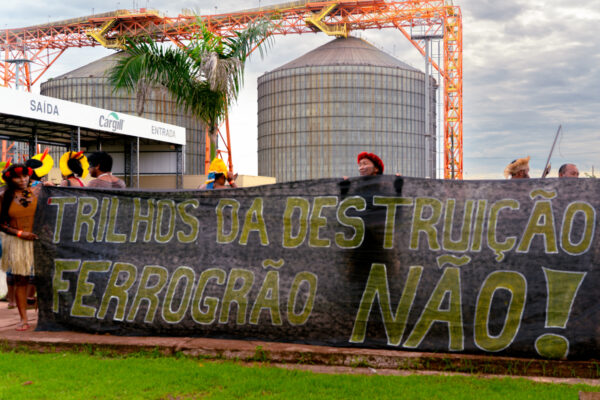Marseille, France – Members of the International Union for Conservation of Nature (IUCN) have approved motion 129, a call-to-action titled “Avoid the point of no return in the Amazon by protecting 80% by 2025.” The motion – which was approved after several debates – was proposed by the Coordinator of Indigenous Organizations of the Amazon Basin (COICA) and various civil organizations. This coalition calls for a global pact to protect the world’s largest tropical forest, which is on the verge of reaching a point of no return.
“Motion 129 broadens the conversation about the planetary crisis and the decisions that will change our lives in the near future,” said José Gregorio Díaz Mirabal, General Coordinator of COICA and leader of the delegation present in Marseille for the 2020 IUCN World Conservation Congress. “We require urgent measures that respond to the specificity and diversity of ecosystems and those who inhabit them, otherwise, the inertia of global politics reflected in national policies leads us to an apocalyptic scenario. Indigenous Peoples have come to defend our home and, in doing so, defend the planet. This motion is a first step.”
The agreed upon date to meet global conservation goals is the year 2030. Currently, 17 percent of the Amazon has suffered deforestation and an additional 17 percent of its rainforests have been degraded.
Scientists have concluded that if 20-25 percent of the Amazon is destroyed, Earth’s largest tropical ecosystem would reach a point of no return, unleashing disastrous effects for climate and weather patterns regionally and globally. Given the urgency, immediate action is needed in this region; hence the proposal for protecting 80 percent of the Amazon by 2025. Science warns that in as little as nine years, the Amazon as we know it may cease to exist.
The approval of motion 129 appeals to the Durban Accord, an IUCN instrument that was approved in 2003, which paves the way for a new paradigm in the management and administration of protected areas by Indigenous Peoples and local communities.
This governance model is being defended as both an existing mechanism to recognize those who inhabit these territories, and an immediate solution to mitigate climate change.
“Currently, protected areas are constrained by government budgets while indigenous territories, whose governance has conserved the Amazon basin for centuries, have not been recognized in national or international budgets,” said Carmen Josse, from the Amazon Geo-Referenced Socio-Environmental Information Network (RAISG), a Pan-Amazonian network of experts who offer scientific data that describe the imminent “tipping point” that threatens the Amazon, and suggest strategies for its protection.
Why is the approval of motion 129 so significant?
This urgent motion arises from the need to think about global objectives from the context of specific geographic areas. These are some of its key takeaways:
- CALLS ON the Director General and Members of IUCN to support the area-based conservation targets, in order to protect and conserve at least 80% of the Amazon by 2025, as a measure to ensure ecosystem integrity, halt deforestation and land-use change, and prevent the point of no return being reached;
- URGES State and the government agency Members of IUCN to ensure the full implementation of the Durban Accord adopted by IUCN in 2003, which allows Indigenous Peoples and local communities to govern and administer new protected areas;
- CALLS ON State and government agency Members of IUCN in the Amazon to fully recognize and demarcate all the ancestral land and territories belonging to Indigenous Peoples and local communities, recognizing their local governance authorities by 2025;
- ENCOURAGES State and government agency Members of IUCN in the Amazon to promote efforts to restore at least half of the degraded forest areas in the Amazon Basin by 2025;
- DEMANDS that State and government agency members of IUCN enact moratoria on industrial activities that are carried out in primary forests; and
- ENCOURAGES funding agencies to increase support for protected areas and climate projects designed to maintain or restore ecosystem integrity.
Motion 129 was presented by COICA and the Amazon 80 x 2025 Coalition with input and support from 17 organizations who have described this vote as the beginning of a new and disruptive conservation movement led by Indigenous Peoples. Encouraged by the attention received at the IUCN congress and the growing body of evidence supporting their demand for recognition of community rights to land, Indigenous organizations and their leaders demand a decisive role in determining the best way to protect the very resources that only exist while its guardians remain in their traditional territories.
Research confirms current state of emergency in the Amazon
The Amazon has already lost 17 percent of its forest cover and an additional 17 percent of its rainforests have been degraded. If deforestation and forest degradation continue to grow and the 20-25 percent threshold is crossed, this vital ecosystem will reach an irreversible tipping point that can result in the regressive death of the entire Amazon and turn the region into a savanna.
“The evidence shows that Indigenous Peoples and local communities are the best resource to protect the Amazon rainforest, but their territories are increasingly threatened by legal and illegal activities. They need the support of the international community and national governments to ensure that their territories are recognized and that their human rights are respected. We must strengthen their traditional forest management systems, their traditional knowledge, and cultural identity, and their ability to conserve the resources that are key to achieving climate and biodiversity goals,” said David Kaimowitz, Forest and Farm Facility Manager of the Food and Agriculture Organization of the United Nations.













